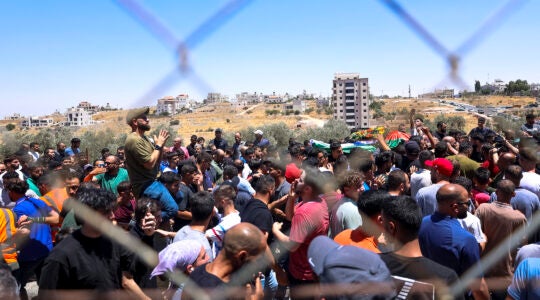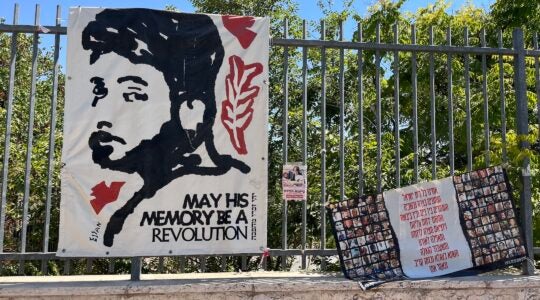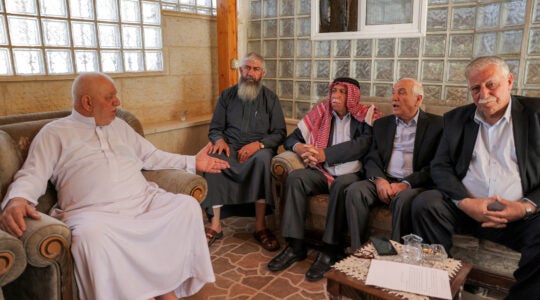JERUSALEM (JTA) – After a Kassam rocket attack seriously injured two brothers in the Israeli border town of Sderot, Prime Minister Ehud Olmert again came under intense pressure to launch a major military strike against Hamas in the Gaza Strip.
Israeli media, opposition and coalition politicians, and Sderot residents all are urging the government to hit Hamas hard.
Jerusalem is considering two possible courses of action: assassination of top Hamas military and political leaders or a large-scale ground invasion of Gaza to smash Hamas’ military infrastructure.
Hamas leaders, including Ismail Haniyeh, the former Palestinian Authority prime minister, reportedly have gone into hiding.
Olmert’s dilemma is not so much over whether to order the assassinations – Israel already has been carrying out targeted assassinations in Gaza, though not of Hamas’ top leaders – but over the proposed land invasion.
After the Winograd Commission’s harsh report two weeks ago on his performance during the 2006 Lebanon war, Olmert is understandably hesitant about getting into a second unsuccessful military imbroglio.
Over the past several weeks, Palestinians in Gaza have fired hundreds of rockets at Israeli civilian populations in and around Sderot.
Last Saturday night, brothers Rami and Osher Twito, 19 and 8, were hit while walking in town. Both suffered multiple injuries; Osher had to have his left leg amputated.
The attack prompted a massive protest in Jerusalem highlighting Israel’s inability to stop the Kassams. Sderot residents marched through Jerusalem on Sunday carrying remnants of Kassam rockets and placards calling on Olmert to resign. They also stopped traffic in Jerusalem and Tel Aviv.
Under banner headlines, the nation’s newspapers demanded action. Even the left-leaning daily Ha’aretz carried an editorial titled “Restraint is not possible.”
Politicians on both sides of the political divide were equally blunt.
Likud opposition leader Benjamin Netanyahu lambasted government ineptitude and called for an immediate invasion of Gaza. Interior Minister Meir Shitreet urged the government to warn the residents of a Gaza neighborhood to leave and then wipe the neighborhood off the map.
Tzahi Hanegbi, the chairman of the Knesset’s Foreign Affairs and Defense Committee, said Gaza is an Iranian forward position, and he called on the government to assassinate Hamas’ political leadership and topple Gaza’s Hamas regime.
According to some reports, the government already has ordered the Israel Defense Forces to step up assassinations of Hamas operatives and to target the organization’s higher echelons.
Besides Haniyeh, Hamas military chief Ahmad Ja’abri and other top militia commanders have gone underground. Gaza sources say only their close bodyguards know where they are.
Hamas has warned that it would mount an unprecedented retaliation if any of its leaders were assassinated. Spokesman Sami Abu Zuheri said such an Israeli attack would force the organization to use “everything it had at its disposal.”
As for a ground invasion, the IDF assessment is that a full-scale land operation in Gaza could cost Israel hundreds of soldiers and cause even more damage to the home front than the 34-day bombardment of northern Israel in the summer of 2006, when Hezbollah fired some 4,000 Katyusha rockets into Israel. Furthermore, the IDF has told Olmert the Air Force could get better results after winter.
Most important, Olmert is still working on coordinating a strategy for Gaza with the international community. As with Lebanon, Israel wants to see an international peacekeeping force move into Gaza to control the situation in place of the IDF. Thus far, however, no overseas countries seem ready to commit troops to such a dangerous mission.
In the meantime, Olmert seems to be playing for time. Remarking on the anger of the people of Sderot, the prime minister said that while he sympathizes with their plight, “rage is not a policy.” And he declared that “there is no way to put an absolute end to terrorism with a single blow.”
Most Israeli pundits believe that with or without international coordination, a large-scale invasion of Gaza is inevitable. The only question seems to be when and how big the operation will be.
The IDF could be ordered to capture all or part of Gaza, and to stay for months or just weeks or days.
Defense Minister Ehud Barak told the Knesset’s Foreign Affairs and Defense Committee on Monday that he had ordered the IDF to be ready to launch a ground operation and to deal with all the potential implications, meaning various units are rehearsing and coordinating specific missions.
It also means Barak and IDF Chief of Staff Gabi Ashkenazi are honing their operational plans.
“It won’t take two days or two weeks, but the IDF will stop the Kassams,” Barak declared.
The ground offensive could come at any time.
Hamas’ strategy seems to be to push Israel into a cease-fire before any ground invasion occurs so Hamas can claim victory.
Hamas also is trying to give the impression that it is the party under attack, and that the Kassams are being fired in retaliation for Israeli attacks.
“If Israel stops its attacks, we will ready to discuss a cease-fire,” Hamas spokesman Fawzi Barhoum declared Sunday. But Olmert refuses to deal with Hamas unless it renounces terrorism and recognizes Israel.
Over the past month, Hamas has been trying to create a deterrent balance, hitting back hard after successful Israeli strikes.
For example, after Israel killed 16 militants in cross-border raids last week, Hamas fired 135 rockets over the following five days. This is meant to deter further Israeli raids and give the impression that Hamas, not Israel, is retaliating.
The Hamas thinking is that the group might be able to force Israel into a cease-fire because of Israel’s reluctance to embark on a ground offensive in the wake of the 2006 Lebanon experience. But Hamas leaders could be misreading the degree of Israeli anger at the Kassams and the government’s resolve to stop them.
The result could be a war in Gaza, with grave consequences for Hamas.
Indeed, some Israeli observers are talking about a looming Palestinian catastrophe on a par with the Palestinian defeat, or “Naqba,” in the 1948 war with Israel.
“An extremist and irresponsible leadership is leading its people to disaster,” Maj. Gen. Shlomo Gazit, a former IDF intelligence chief, declared. “That’s what happened 60 years ago, and although no one wants it, that is what is about to happen again in the not too distant future.”
JTA has documented Jewish history in real-time for over a century. Keep our journalism strong by joining us in supporting independent, award-winning reporting.





